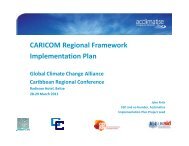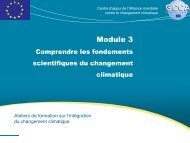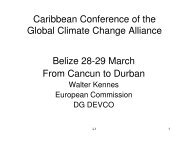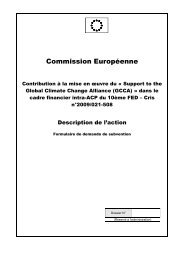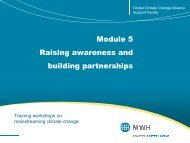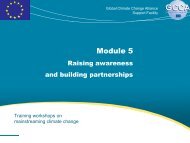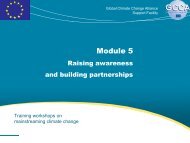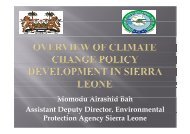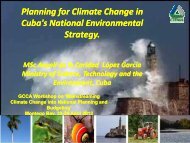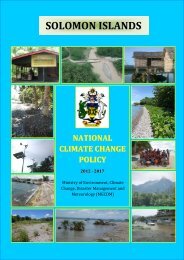Rwanda Green Growth Strategy 18nov11 - Global Climate Change ...
Rwanda Green Growth Strategy 18nov11 - Global Climate Change ...
Rwanda Green Growth Strategy 18nov11 - Global Climate Change ...
Create successful ePaper yourself
Turn your PDF publications into a flip-book with our unique Google optimized e-Paper software.
Chapter 6A National Industrial Policy for <strong>Rwanda</strong> was published in April 2011 by the Ministry of Trade andIndustry (MINICOM). It makes three policy statements:• Government will provide sector-support for existing dynamic clusters to boost domesticproduction and foster export competitiveness.• Government will promote future sector with a focus on medium and high-tech industries.• Government will provide an enabling environment to achieve the above.The policy is issue-specific and focuses on overcoming barriers to industrialisation and targets key growthclusters. It supports environmental sustainability but it needs to be updated to promote low carbondevelopment and take advantage of the opportunities in climate finance.The three key stakeholders for private sector development apart from MINICOM are: the <strong>Rwanda</strong>Development Board (RDB) who provides exporters with trade and market information and investors,advises government of measures to stimulate export trade and acts as a one-stop-shop for investors toreduce the cost of doing business in <strong>Rwanda</strong>; the Private Sector Federation (PSF) which aims to strengthenthe private sector through human capacity building, sourcing sustainable funding, developing memberassociations and providing dispute arbitration; and the <strong>Rwanda</strong> Resource Efficient and Cleaner ProductionCentre (RRECPC) which promotes more efficient use of raw materials, energy and water to ensure a lifecycle approach and environmental sustainability.Economic AnalysisThe Programmes of Action are based on detailed study recorded in the working papers. Althoughtimelines and comparative costs are given, further work is required to quantify, in monetary terms, each ofthe programmes of action and incorporate them into the macroeconomic and financial projections of theEDPRS and Sector Strategies. Cost-Benefit Analyses (CBAs) should be conducted in an integrated crosssectoralmanner to take into account the costs and benefits of all <strong>Rwanda</strong>n stakeholders. Furthermore, toensure sustainability of resource consumption, they should account for the costs and benefits that aprogramme would have on future generations. In order to ensure an optimal distribution of <strong>Rwanda</strong>nresources, CBAs must appraise both market and non-market goods and services. Ecosystem services,including water filtration, water table regulation, erosion mitigation, pollination, pest control and carbonsequestration must be valued. Non-use values, including stakeholders’ preferences to preserve a park orprotect a species, should be appraised using valuation techniques such as contingent valuation, choicemodelling, and revealed preference methods. CBAs that do not account for non-market goods andservices are at best incomplete, and at worst, misleading.CBA will help prioritise the programmes, and develop a timeline for implementation that is bothfeasible and desirable in light of other macroeconomic goals. The leads and lags between investment in theprogrammes (building of institutional capacity, economic infrastructure, funding research and otherinvestments) and increases in productivity could have macroeconomic management implications forinflation, balance of payments and unintended resource shifts across sectors. Therefore, it is essential thatthe various elements of the <strong>Strategy</strong> be incorporated into economic and financial projections of EDPRS andSector Strategies. These projections will generate a perspective of the scope for balancing theimplementation of the <strong>Strategy</strong> and other macroeconomic goals of price stability, a viable balance ofpayments and fiscal sustainability, as well as broad measures of social welfare.46Government of <strong>Rwanda</strong>



